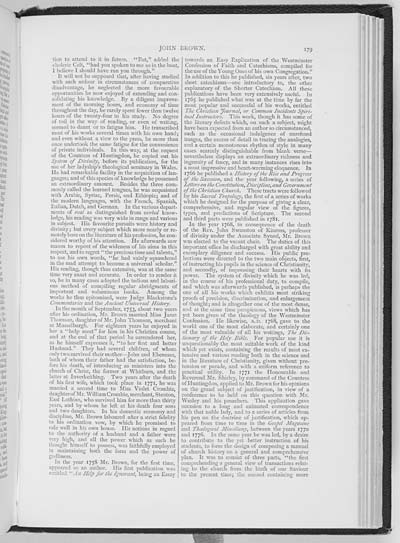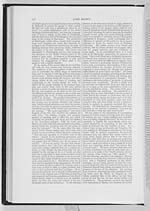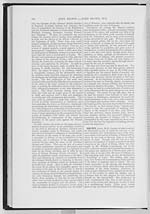179
tion to attend to it in future. "But," added the
choleric Celt, "had you spoken to me so in the boat,
I believe I should have run you through."
It will not be supposed that, after having studied
with such ardour in circumstances of comparative
disadvantage, he neglected the more favourable
opportunities he now enjoyed of extending and con-
solidating his knowledge. By a diligent improve-
ment of the morning hours, and economy of time
throughout the day, he rarely spent fewer than twelve
hours of the twenty-four in his study. No degree
of toil in the way of reading, or even of writing,
seemed to daunt or to fatigue him. He transcribed
most of his works several times with his own hand;
and even without a view to the press, he more than
once undertook the same fatigue for the convenience
of private individuals. In this way, at the request
of the Countess of Huntingdon, he copied out his
System of Divinity, before its publication, for the
use of her ladyship's theological seminary in Wales.
He had remarkable facility in the acquisition of lan-
guages; and of this species of knowledge he possessed
an extraordinary amount. Besides the three com-
monly called the learned tongues, he was acquainted
with Arabic, Syriac, Persic, and Ethiopic; and of
the modern languages, with the French, Spanish,
Italian, Dutch, and German. In the various depart-
ments of real as distinguished from -verbal know-
ledge, his reading was very wide in range and various
in subject. His favourite pursuits were history and
divinity; but every subject which more nearly or re-
motely bore on the literature of his profession, he con-
sidered worthy of his attention. He afterwards saw
reason to repent of the wideness of his aims in this
respect, and to regret "the precious time and talents,"
to use his own words, "he had vainly squandered
in the mad attempt to become a universal scholar."
His reading, though thus extensive, was at the same
time very exact and accurate. In order to render it
so, he in many cases adopted the tedious and labori-
ous method of compiling regular abridgments of
important and voluminous books. Among the
works he thus epitomized, were Judge Blackstone's
Commentaries and the Ancient Universal History.
In the month of September, 1753, about two years
after his ordination, Mr. Brown married Miss Janet
Thomson, daughter of Mr. John Thomson, merchant
at Musselburgh. For eighteen years he enjoyed in
her a "help meet" for him in his Christian course,
and at the end of that period he surrendered her,
as he himself expresses it, "to her first and better
Husband." They had several children, of whom
only two survived their mother�John and Ebenezer,
both of whom their father had the satisfaction, be-
fore his death, of introducing as ministers into the
church of Christ, the former at Whitburn, and the
latter at Inverkeithing. Two years after the death
of his first wife, which took place in 1771, he was
married a second time to Miss Violet Crombie,
daughter of Mr. William Crombie, merchant, Stenton,
East Lothian, who survived him for more than thirty
years, and by whom he left at his death four sons
and two daughters. In his domestic economy and
discipline, Mr. Brown laboured after a strict fidelity
to his ordination vow, by which he promised to
rule well in his own house. His notions in regard
to the authority of a husband and a father were
very high, and all the power which as such he
thought himself to possess, was faithfully employed
in maintaining both the form and the power of
godliness.
In the year 1758 Mr. Brown, for the first time,
appeared as an author. His first publication was
entitled "An Help for the Ignorant, being an Essay
towards an Easy Explication of the Westminster
Confession of Faith and Catechisms, compiled for
the use of the Young Ones of his own Congregation."
In addition to this he published, six years after, two
short catechisms�one introductory to, the other
explanatory of the Shorter Catechism. All these
publications have been very extensively useful. In
1765 he published what was at the time by far the
most popular and successful of his works, entitled
The Christian Journal, or Common Incidents Spiri-
tual Instructors. This work, though it has some of
the literary defects which, on such a subject, might
have been expected from an author so circumstanced,
such as the occasional indulgence of unrefined
images, the excess of detail in tracing the analogies,
and a certain monotonous rhythm of style in many
cases scarcely distinguishable from blank verse�
nevertheless displays an extraordinary richness and
ingenuity of fancy, and in many instances rises into
a most impressive and heart-warming eloquence. In
1766 he published a History of the Rise and Progress
of the Secession, and the year following, a series of
Letters on the Constitution, Discipline, and Government
of the Christian Church. These tracts were followed
by his Sacred Tropology, the first of a series of works
which he designed for the purpose of giving a clear,
comprehensive, and regular view of the figures,
types, and predictions of Scripture. The second
and third parts were published in 1781.
In the year 1768, in consequence of the death
of the Rev. John Swanston of Kinross, professor
of divinity under the Associate Synod, Mr. Brown
was elected to the vacant chair. The duties of this
important office he discharged with great ability and
exemplary diligence and success. His public pre-
lections were directed to the two main objects, first,
of instructing his pupils in the science of Christianity,
and secondly, of impressing their hearts with its
power. The system of divinity which he was led,
in the course of his professional duty, to compile,
and which was afterwards published, is perhaps the
one of all his works which exhibits most striking
proofs of precision, discrimination, and enlargement
of thought; and is altogether one of the most dense,
and at the same time perspicuous, views which has
yet been given of the theology of the Westminster
Confession. He likewise, A.D. 1768, gave to the
world one of the most elaborate, and certainly one
of the most valuable of all his writings, The Dic-
tionary of the Holy Bible. For popular use it is
unquestionably the most suitable work of the kind
which yet exists, containing the results of most ex-
tensive and various reading both in the science and
in the literature of Christianity, given without pre-
tension or parade, and with a uniform reference to
practical utility. In 1771 the Honourable and
Reverend Mr. Shirley, by command of the Countess
of Huntingdon, applied to Mr. Brown for his opinions
on the grand subject of justification, in view of a
conference to be held on this question with Mr.
Wesley and his preachers. This application gave
occasion to a long and animated correspondence
with that noble lady, and to a series of articles from
his pen on the doctrine of justification, which ap-
peared from time to time in the Gospel Magazine
and Theological Miscellany, between the years 1770
and 1776. In the same year he was led, by a desire
to contribute to the yet better instruction of his
students, to form the design of composing a manual
of church history on a general and comprehensive
plan. It was to consist of three parts, "the first
comprehending a general view of transactions relat-
ing to the church from the birth of our Saviour
to the present time; the second containing more

![]() Universal Viewer |
Universal Viewer | ![]() Mirador |
Large image | Transcription
Mirador |
Large image | Transcription
![]()

